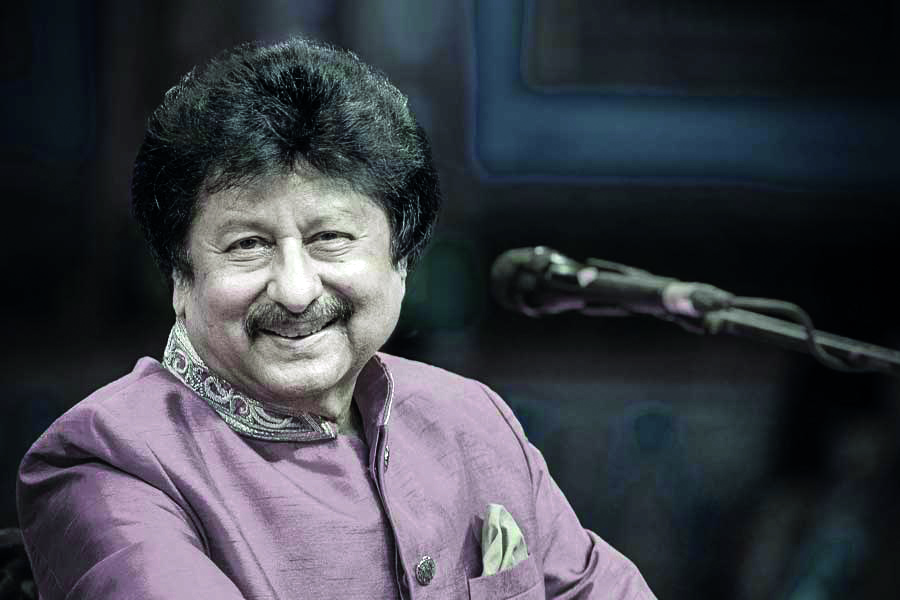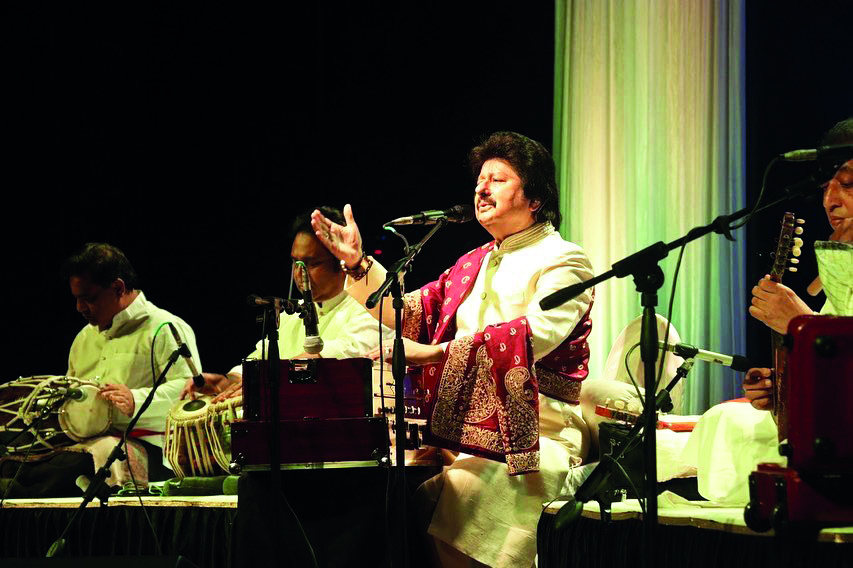Timeless legacy of the ghazal
Revitalising the ghazal genre, Pankaj Udhas — a revered name in Indian music — rose from Gujarat to attain global recognition, exhibiting resilience in artistry, and leaving an enduring imprint on the country’s already vibrant musical heritage

In the panorama of Indian music, Pankaj Udhas stands out as a colossus, an artist whose name is irrevocably intertwined with the ghazal genre’s resurgence and popularity. Born into a Gujarati family in Jetpur on May 17, 1951, Udhas’s foray into music was not just a career choice but a calling that beckoned him from a young age. His journey from a small town in Gujarat to the zenith of Indian music is a narrative of passion, resilience, and the transformative power of art.
The early years of Udhas’s career were a testament to his unwavering commitment to ghazals. Despite facing initial setbacks, his debut album “Aahat” in 1980 laid the groundwork for a career that would go on to redefine ghazal singing in India. His breakthrough came with “Chandi Jaisa Rang Hai Tera,” a ghazal that became an anthem for lovers and a staple in Udhas’s repertoire.
Udhas’s velvet voice and his ability to convey deep emotional narratives through music earned him a revered place in the hearts of listeners. His albums “Shagufta,” “Shabab,” “Aafreen,” and “Nabeel” were not just collections of songs but emotional journeys that explored the myriad facets of love, longing, and loss.
His contribution to the film industry, particularly the song “Na Kajre Ki Dhar” from the movie “Mohra,” showcased his versatility and the seamless integration of ghazal into mainstream cinema. This song, among others, played a pivotal role in bringing ghazal to a wider audience, transcending the traditional boundaries that confined it to niche listenership.
Pankaj Udhas’s discography is a treasure trove of ghazals that encapsulate the essence of love, nostalgia, and the intricacies of human emotions. Beyond the already mentioned classics, his work spans a wide array of albums, each with its own unique flavour and thematic depth, contributing significantly to his status as a stalwart in the Indian music industry.
One of Udhas’s remarkable albums, “Mahek,” released in the late 1990s, featured the ghazal “Zara Ahista Chal,” which became immensely popular for its soulful melody and poignant lyrics. The album showcased Udhas’s ability to blend traditional ghazal sensibilities with contemporary sounds, making it accessible to a wider audience.
Another noteworthy contribution is the album “Hasrat,” a tribute to the poet Hasrat Mohani. In this album, Udhas delved deep into the poet’s rich repertoire, bringing to life the lyrical beauty of his poetry through his melodious voice. The album was not just a musical endeavour but a cultural contribution, preserving and promoting the work of one of Urdu poetry’s greats.
“Paimana,” another gem in Udhas’s discography, features ghazals that are a blend of romantic and philosophical themes. The title track, “Paimana Bideh,” is particularly renowned for its lyrical depth and Udhas’s emotive rendition, which tugs at the heartstrings of listeners.
Udhas’s album “Stolen Moments” is a collection of ghazals that are introspective and contemplative, offering listeners a glimpse into the more subtle and nuanced emotions of love and longing. The track “Ahista” stands out for its lyrical eloquence and the soft, haunting melody that lingers long after the song has ended.
In “Aman,” Udhas explores themes of peace and harmony, a departure from his usual repertoire of love ghazals. This album reflects his versatility as an artist and his ability to engage with a variety of themes, resonating with listeners on different levels.
One of Udhas’s significant contributions to the ghazal genre is his ability to introduce it to younger audiences through his collaborations and live performances. His concert series, “Ghazal Nights,” has been a platform where he has performed not just his own compositions but also celebrated the works of other legendary ghazal singers, thereby keeping the tradition alive and thriving.
Udhas’s involvement in Bollywood has also been notable, with his ghazals adding depth and emotion to numerous films. His song “Chitthi Aayi Hai” from the movie “Naam” remains one of the most heart-wrenching renditions in Indian cinema, beautifully capturing the pain of separation and the longing for one’s homeland.
Moreover, Udhas’s collaboration with contemporary poets and lyricists has led to the creation of ghazals that resonate with the modern sensibilities of love and life, while still retaining the classical charm of the genre. His album “Dastkhat,” which features ghazals written by renowned poets like Nida Fazli, showcases this blend of the contemporary and the classic.
In celebrating Pankaj Udhas’s body of work, one recognises the breadth of his contributions to not just the ghazal genre but to Indian music as a whole. His dedication to preserving the essence of ghazal while making it relevant for contemporary listeners is a testament to his genius and his enduring legacy in the world of music. Through his vast array of albums and songs, Udhas has created a musical legacy that continues to inspire and enthral listeners around the world, ensuring that the beauty and depth of ghazals remain a cherished part of India’s cultural heritage.

Throughout his illustrious career, Udhas received numerous accolades, including the prestigious Padma Shri in 2006, which acknowledged his contribution to Indian music and his role in popularizing ghazals globally. His international tours and concerts across countries like the USA, Canada, the UK, and the Middle East not only brought him international fame but also showcased the global appeal of ghazals.
Udhas was not just a musician but a philanthropist at heart. His initiative “Khazana – A Festival of Ghazals” served as a platform for upcoming artists and a means to support charitable causes, reflecting his belief in giving back to society.
Despite his monumental success, Udhas remained grounded, often speaking about the timeless nature of ghazals and their relevance in modern times. He was a mentor to many and a source of inspiration for artists across genres.
As the news of Pankaj Udhas’s passing spread, the music world and his fans were engulfed in a profound sense of loss. The ghazal maestro, who had enchanted audiences for over four decades with his soul-stirring renditions, left behind a void that seemed impossible to fill. His demise marked the end of an era, but his legacy was far from over.
Tributes poured in from all corners of the globe, reflecting the deep impact Udhas had on the music industry and the lives of countless individuals. His contributions to ghazal music were celebrated, with many noting how he had breathed new life into the genre, infusing it with a modern sensibility while staying true to its classical roots.
In his passing, Pankaj Udhas left behind a rich tapestry of music that continues to inspire and comfort. His ghazals, imbued with poetic lyricism and emotive depth, serve as a testament to his artistic genius. They remind us of the power of music to transcend time, language, and geographical boundaries.
Pankaj Udhas’s journey from a young boy enamoured with ghazals in Gujarat to become a beacon of this art form on the global stage is a narrative of dedication, talent, and the enduring allure of ghazal music. As we reflect on his life and legacy, we are reminded that while the maestro may have left us, his music will forever remain, echoing through the annals of time, a beacon of love, longing, and the profound beauty of the human experience.
In celebrating Pankaj Udhas, we celebrate not just a musician but a legend whose contributions have shaped the cultural fabric of Indian music. His story is a beacon for future generations, illuminating the path of artistic pursuit and the timeless appeal of ghazal. As we bid farewell to the ghazal maestro, we hold close to the melodies that he gifted the world, melodies that will continue to resonate and inspire, keeping Pankaj Udhas’s spirit alive for eternity.
Views expressed are personal




